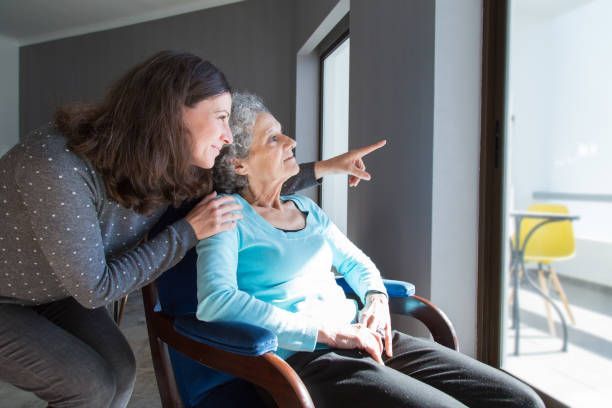Ideas for Communicating with Parents Who Won't Listen
Ideas For Communicating
With Parents Who Won't Listen
As elderly parents age, it is critical to slow down and attentively observe the changes they are experiencing, both physically and emotionally. Recognizing these shifts allows caregivers to better understand the roots of their parents' resistances, which are often fueled by fear, loss of independence, and discomfort with change. To effectively communicate under these circumstances, caregivers must adopt a patient and empathetic approach, considering a variety of ideas and techniques tailored to their parents' specific needs. This might involve simplifying conversations, using clear and respectful language, and actively listening to their concerns without judgment. It’s also beneficial to incorporate visual aids or written notes to reinforce messages and ensure comprehension. By fostering a supportive and understanding environment, caregivers can help alleviate anxieties and build a more cooperative relationship with their elderly parents.

7 Day Home Care is a leading provider of home care services across Manhattan, Brooklyn, Queens, Nassau County, and Suffolk County, New York. Our expertise lies in supporting families as they navigate the complex and often challenging journey of caring for aging parents. We understand that this task becomes even more difficult when parents are resistant to help, creating additional stress and obstacles for caregivers. In these situations, effective communication is crucial. It can make a significant difference in easing tensions and fostering cooperation. In this comprehensive guide, we delve into detailed strategies for dealing with aging parents who are reluctant to listen. We provide insights into their emotional landscape, practical tips for improving dialogue, and approaches to building trust and understanding, ensuring that caregivers are equipped with the tools needed to support their loved ones effectively.
Understanding an Elderly Parent's Perspective
Consider The Emotional Impact of Aging
Aging can be a daunting and isolating experience. As physical and cognitive abilities decline, many elderly individuals experience a range of emotions including fear, insecurity, and anger. Understanding these feelings is crucial for effective communication. Your parents may resist help because they feel a loss of independence and control over their lives. Common Emotional Responses:
- Fear: Anxiety about losing autonomy or being a burden.
- Insecurity: Concerns about health, finances, and the future.
- Anger: Frustration over diminished capabilities and lifestyle changes.
Empathy in Communication with Your Elderly Parent
To effectively communicate with your aging parents, it's essential to empathize with their situation. Acknowledge their fears and concerns without dismissing them. Show them that you are there to support them, not to take over their lives. Strategies for Empathy:
- Active Listening: Give your full attention, show empathy, and validate their feelings.
- Reflective Statements: Repeat back what they say to show understanding.
- Avoid Judgment: Refrain from criticizing their emotions or decisions.
Effective Communication Techniques with Elderly Parent
Calm and Respectful Dialogue
When discussing sensitive topics, maintain a calm and respectful tone. Avoid lecturing or nagging, as this can lead to defensiveness and resistance. Focus on having a constructive conversation where both parties feel heard and respected. Key Communication Techniques:
- Use "I" Statements: Express your feelings and concerns without blaming. For example, "I worry about your safety when you go out alone."
- Ask Open-Ended Questions: Encourage dialogue by asking questions that require more than yes or no answers. For example, "How do you feel about having someone help with household tasks?"
- Express Appreciation: Acknowledge their efforts and express gratitude for their cooperation.
Listening and Offering Support
Listening is a fundamental aspect of effective communication. Show genuine interest in their concerns and offer support rather than solutions. This approach can help build trust and open lines of communication. Tips for Effective Listening:
- Maintain Eye Contact: Show that you are engaged in the conversation.
- Nod and Respond Appropriately: Use non-verbal cues to show understanding.
- Avoid Interruptions: Let them finish their thoughts before responding.
Patience with an Elderly Parent is Key
Gradual Acceptance of Help
It may take time for your parents to accept the idea of receiving help. Be patient and continue to offer your support without pressuring them. Gradual acceptance is often more sustainable than forced compliance. Steps to Encourage Acceptance:
- Introduce Help Gradually: Start with small tasks and gradually increase assistance.
- Highlight Benefits: Emphasize the positive aspects of receiving help, such as increased safety and independence.
- Share Success Stories: Use examples of others who have benefited from similar support.
Dealing with Elderly Parent's Resistance
Resistance is common and can be challenging to manage. It's important to remain patient and not take their resistance personally. Continue to provide support and revisit the conversation at a later time if necessary. Coping Strategies for Resistance:
- Stay Calm: Avoid escalating the situation with a defensive or angry response.
- Be Consistent: Maintain a steady approach, reinforcing the benefits of help.
- Seek Compromise: Find middle ground that satisfies both parties.
Enlisting the Help of Others
Family and Friends
Sometimes, involving other family members or close friends can help in communicating with resistant parents. Different voices and perspectives can reinforce the message and show a united front. Effective Use of Support Networks:
- Family Meetings: Organize discussions with multiple family members to provide a collective perspective.
- Close Friends: Sometimes, advice from a trusted friend can be more readily accepted.
- Collaborative Decision-Making: Involve your parents in decisions to make them feel included and respected.
Home Health Aides and Professional Caregivers
Hiring a professional caregiver can be an effective way to ensure that your parents receive the necessary help. Professional caregivers are trained to handle the complexities of aging and can provide both physical and emotional support. Benefits of Professional Caregivers:
- Expertise in Elder Care: Trained to manage various health and emotional issues.
- Consistent Care: Provides regular and reliable assistance.
- Objective Perspective: Can offer neutral insights that family members might miss.
Setting Boundaries
Importance of Boundaries
Setting boundaries is essential, especially if your parents' behavior becomes challenging or detrimental. Clear boundaries help maintain a healthy relationship and ensure that both parties' needs are respected. Establishing Boundaries:
- Define Acceptable Behavior: Clearly communicate what behaviors are acceptable and what are not.
- Consistent Enforcement: Apply boundaries consistently to avoid confusion.
- Mutual Respect: Ensure that boundaries are respectful and considerate of both parties' needs.
Managing Difficult Behaviors
In some cases, difficult behaviors may require more structured interventions. Seeking the help of a therapist or counselor can provide additional strategies for managing these challenges. Techniques for Managing Behaviors:
- Behavioral Contracts: Agreements that outline expected behaviors and consequences.
- Therapeutic Support: Professional counseling to address underlying issues.
- Crisis Management Plans: Prepared responses for dealing with severe or disruptive behaviors.
Understanding the broader context of caregiving can provide valuable insights and reassurance. Many adults find themselves providing care for aging parents or other relatives, which can be both rewarding and challenging. Caregiving often requires a significant time commitment, with many dedicating a substantial portion of their week to this responsibility. This role can become even more demanding when aging parents resist help, increasing their risk of falls, injuries, and other health problems. Additionally, the emotional toll on caregivers can be profound, with many experiencing feelings of depression and anxiety. These challenges highlight the widespread nature of caregiving and the importance of addressing resistance to help, as it has serious implications for both the caregiver and the care recipient.
Resources and Support
Support Networks
Building a strong support network is crucial for managing the challenges of caregiving. This network can include family, friends, healthcare professionals, and community resources. Types of Support Networks:
- Family and Friends: Provide emotional and practical support.
- Caregiver Support Groups: Offer a platform to share experiences and advice.
- Community Services: Local organizations that offer various forms of assistance.
Professional Home Care Agency Services Near You
Professional services, such as those offered by 7 Day Home Care, can provide comprehensive support tailored to the needs of both caregivers and their aging parents. Benefits of Professional Services:
- Customized Care Plans: Tailored to meet the specific needs of each individual.
- Expertise and Training: Access to skilled professionals with experience in elder care.
- Peace of Mind: Assurance that your loved one is receiving high-quality care.
Caring for aging parents who are resistant to help can be a challenging and emotionally taxing experience. However, with understanding, effective communication, patience, and the right support, it is possible to navigate these challenges successfully. 7 Day Home Care is dedicated to providing the necessary support and guidance to help you care for your parents while maintaining your own well-being.
If you are caring for aging parents who won't listen to your concerns, know that you are not alone. There are resources available to help you. 7 Day Home Care can provide you with the support and guidance you need to care for your parents and maintain your own well-being. 7 Day Home Care is licensed by the New York State Department of Health to provide in-home care services throughout Manhattan, Queens, Brooklyn, Nassau County, and Suffolk County, New York. Contact us today at 516-408-0034 to learn more about our home care agency services.
Brian Callahan
7 Day Home Care










